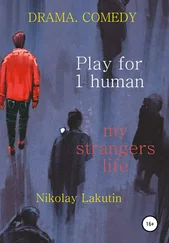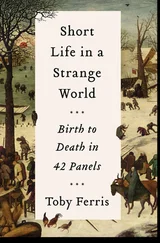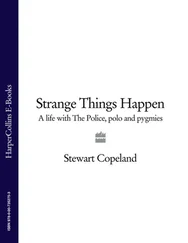Douglas Hofstadter - I Am a Strange Loop
Здесь есть возможность читать онлайн «Douglas Hofstadter - I Am a Strange Loop» весь текст электронной книги совершенно бесплатно (целиком полную версию без сокращений). В некоторых случаях можно слушать аудио, скачать через торрент в формате fb2 и присутствует краткое содержание. Жанр: Прочая документальная литература, на английском языке. Описание произведения, (предисловие) а так же отзывы посетителей доступны на портале библиотеки ЛибКат.
- Название:I Am a Strange Loop
- Автор:
- Жанр:
- Год:неизвестен
- ISBN:нет данных
- Рейтинг книги:4 / 5. Голосов: 1
-
Избранное:Добавить в избранное
- Отзывы:
-
Ваша оценка:
- 80
- 1
- 2
- 3
- 4
- 5
I Am a Strange Loop: краткое содержание, описание и аннотация
Предлагаем к чтению аннотацию, описание, краткое содержание или предисловие (зависит от того, что написал сам автор книги «I Am a Strange Loop»). Если вы не нашли необходимую информацию о книге — напишите в комментариях, мы постараемся отыскать её.
I Am a Strange Loop — читать онлайн бесплатно полную книгу (весь текст) целиком
Ниже представлен текст книги, разбитый по страницам. Система сохранения места последней прочитанной страницы, позволяет с удобством читать онлайн бесплатно книгу «I Am a Strange Loop», без необходимости каждый раз заново искать на чём Вы остановились. Поставьте закладку, и сможете в любой момент перейти на страницу, на которой закончили чтение.
Интервал:
Закладка:
I Can’t Tell You How Indescribably Nondescript It Was!
It happens that there are a few common words and phrases in English that have a similarly flavored self-undermining quality. Take the adjective “nondescript”, for instance. If I say, “Their house is so nondescript”, you will certainly get some sort of visual image from my phrase — even though (or rather, precisely because) my adjective suggests that no description quite fits it. It’s even weirder to say “The truck’s tires were indescribably huge” or “I just can’t tell you how much I appreciate your kindness.” The self-undermining quality is oddly crucial to the communication.
There is also a kind of “junior version” of Berry’s paradox that was invented a few decades after it, and which runs like this. Some integers are interesting. 0 is interesting because 0 times any number gives 0. 1 is interesting because 1 times any number leaves that number unchanged. 2 is interesting because it is the smallest even number, and 3 is interesting because it is the number of sides of the simplest two-dimensional polygon (a triangle). 4 is interesting because it is the first composite number. 5 is interesting because (among many other things) it is the number of regular polyhedra in three dimensions. 6 is interesting because it is three factorial (3×2×1) and also the triangular number of three (3+2+1). I could go on with this enumeration, but you get the point. The question is, when do we run into the first un interesting number? Perhaps it is 62? Or 1729? Well, no matter what it is, that is certainly an interesting property for a number to have! So 62 (or whatever your candidate number might have been) turns out to be interesting, after all — interesting because it is uninteresting. And thus the idea of “the smallest uninteresting integer” backfires on itself in a manner clearly echoing the backfiring of Berry’s definition of b.
This is the kind of twisting-back of language that turned Bertrand Russell’s sensitive stomach, as we well know, and yet, to his credit, it was none other than B. Russell who first publicized G. G. Berry’s paradoxical number b. In his article about it in 1906, Gödel’s birthyear (four syllables!), Russell did his best to deflect the paradox’s sting by claiming that it was an illusion arising from a naïve misuse of the word “describable” in the context of mathematics. That notion, claimed Russell, had to be parceled out into an infinite hierarchy of different types of describability — descriptions at level 0, which could refer only to notions of pure arithmetic; descriptions at level 1, which could use arithmetic but could also refer to descriptions at level 0; descriptions at level 2, which could refer to arithmetic and also to descriptions at levels 0 and 1; and so forth and so on. And so the idea of “describability” without restriction to some specific hierarchical level was a chimera, declared Russell, believing he had discovered a profound new truth. And with this brand-new type of theory (the brand-new theory of types), he claimed to have immunized the precious, delicate world of rigorous reasoning against the ugly, stomach-turning plague of Berry-Berry.
Blurriness Buries Berry
While I agree with Russell that something fishy is going on in Berry’s paradox, I don’t agree about what it is. The weakness that I focus in on is the fact that English is a hopelessly imprecise medium for expressing mathematical statements; its words and phrases are far too vague. What may seem precise at first turns out to be fraught with ambiguity. For example, the expression “nine cubed plus forty-eight, all times ten cubed plus one”, which earlier I exhibited as a description of 777,777, is in fact ambiguous — it might, for instance, be interpreted as meaning 777 times 1000, with 1 tacked on at the end, resulting in 777,001.
But that little ambiguity is just the tip of the iceberg. The truth of the matter is that it is far from clear what kinds of English expressions count as descriptions of a number. Consider the following phrases, which purport to be descriptions of specific integers:
• the number of distinct languages ever spoken on earth
• the number of heavenly bodies in the Solar System
• the number of distinct four-by-four magic squares
• the number of interesting integers less than 100
What is wrong with them? Well, they all involve ill-defined notions.
What, for instance, is meant by a “language”? Is sign language a language? Is it “spoken”? Is there a sharp cutoff between languages and dialects? How many “distinct languages” lay along the pathway from Latin to Italian? How many “distinct languages” were spoken en route from Neanderthal days to Latin? Is Church Latin a language? And Pig Latin? Even if we had videotapes of every last human utterance on earth for the past million years, the idea of objectively assigning each one to some particular “official” language, then cleanly teasing apart all the “truly distinct” languages, and finally counting them would still be a nonsensical pipe dream. It’s already meaningless enough to talk about counting all the “items” in a garbage can, let alone all the languages of all time!
Moving on, what counts as a “heavenly body”? Do we count artificial satellites? And random pieces of flotsam and jetsam left floating out there by astronauts? Do we count every single asteroid? Every single distinct stone floating in Saturn’s rings? What about specks of dust? What about isolated atoms floating in the void? Where does the Solar System stop? And so on, ad infinitum.
You might object, “But those aren’t mathematical notions! Berry’s idea was to use mathematical definitions of integers.” All right, but then show me a sharp cutoff line between mathematics and the rest of the world. Berry’s definition uses the vague notion of “syllable counting”, for instance. How many syllables are there in “finally” or “family” or “rhythm” or “lyre” or “hour” or “owl”? But no matter; suppose we had established a rigorous and objective way of counting syllables. Still, what would count as a “mathematical concept”? Is the discipline of mathematics really that sharply defined? For instance, what is the precise definition of the notion “magic square”? Different authors define this notion differently. Do we have to take a poll of the mathematical community? And if so, who then counts as a member of that blurry community?
What about the blurry notion of “interesting numbers”? Could we give some kind of mathematical precision to that? As you saw above, reasons for calling a number “interesting” could involve geometry and other areas of mathematics — but once again, where do the borders of mathematics lie? Is game theory part of mathematics? What about medical statistics? What about the theory of twisting tendrils of plants? And on and on.
To sum up, the notion of an “English-language definition of an integer” turns out to be a hopeless morass, and so Berry’s twisty notion of b, no less than Escher’s twisty notion of two mutually drawing hands, is an ingenious figment of the imagination rather than a genuine strange loop. There goes a promising candidate for strange loopiness down the drain!
Although in this brief digression I’ve made it sound as if the idea Berry had in 1904 was naïve, I must point out that some six decades later, the young mathematician Greg Chaitin, inspired by Berry’s idea, dreamt up a more precise cousin using computer programs instead of English-language descriptions, and this clever shift turned out to yield a radically new proof of, and perspective on, Gödel’s 1931 theorem. From there, Chaitin and others went on to develop an important new branch of mathematics known as “algorithmic information theory”. To go into that would carry us far afield, but I hope to have conveyed a sense for the richness of Berry’s insight, for this was the breeding ground for Gödel’s revolutionary ideas.
Читать дальшеИнтервал:
Закладка:
Похожие книги на «I Am a Strange Loop»
Представляем Вашему вниманию похожие книги на «I Am a Strange Loop» списком для выбора. Мы отобрали схожую по названию и смыслу литературу в надежде предоставить читателям больше вариантов отыскать новые, интересные, ещё непрочитанные произведения.
Обсуждение, отзывы о книге «I Am a Strange Loop» и просто собственные мнения читателей. Оставьте ваши комментарии, напишите, что Вы думаете о произведении, его смысле или главных героях. Укажите что конкретно понравилось, а что нет, и почему Вы так считаете.












